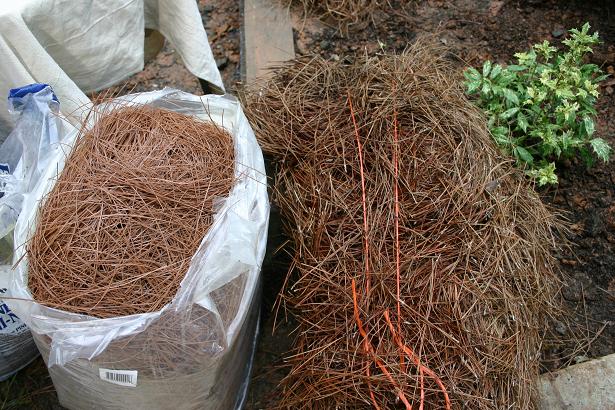Georgia Gardener Newsletter Design Tip: June 29, 2006
Mulch

Can you tell the real from the fake?
Mulch is one of those items in the garden that is often misunderstood, commonly misused,
sometimes missed and occasionally maligned. I would even dare to say that
an entire industry has been born out of the mis-information about mulch.
What is Mulch?
A widely used definition is any loose material that is placed over the soil to conserve moisture
and control weeds. While partially true, this definition overlooks some of the more
critical functions of mulch.
I define mulch as any undecomposed plant material that forms a protective
and nutritive layer over the soil. This can be
leaves (shredded or not), pine or wheat straw, wood chips, shredded bark or limbs and even grass
clippings. While most people understand the protective aspects (moisture retention,
temperature regulation, erosion control and weed prevention),
many people overlook the nutritive importance of mulch.
In the garden mulch:
1. Helps to regulate soil temperature and moisture.
2. Reduces erosion.
3. Helps control weeds.
4. Serves as a slow release fertilizer for plants as it decomposes.
5. Promotes the presence of microorganisms that are necessary for roots to uptake nutrients.
6. Provides an environment for beneficial organisms that protect plants from pests.
7. Is absolutely critical for rebuilding depleted or missing topsoil.
Mulch, True or False?
Fresh mulch from cut trees will release toxins that can kill plants.
False: While fresh mulch can rob soil of Nitrogen if it's mixed in, it's fine to leave
on top of the soil, just don't pile it too high or right up against or over plants.
Mulch attracts termites
Barely True: Mulch is mildly attractive to termites. However, termites are everywhere in our environment
and they will find your house eventually.
It's advisable to keep mulch 12-18 inches away from your foundation and to have
a good termite control plan.
Mulch will make my soil more acidic.
Barely True: The amount of acid produced by the breakdown of mulch is negligible and poses
no problems for most plants. If you are concerned, have a soil test performed and adjust your
pH accordingly.
How Much Mulch?
Depending upon the material, 2-4 inches of mulch is sufficient. Freshly laid pine straw
should be 4-6 inches thick which will allow for settling. Don't pile mulch up against or over
the trunks, stems or crowns of plants or you may have problems with pests and rotting. Unless you
have plant disease problems, don't remove the old mulch. Simply add a new layer over the existing
mulch to achieve the necessary depth. The old mulch will naturally decay and become compost.
What is Compost?
After mulch has been broken down by macro and microorganisms such that it no longer resembles
the original material from which it came, it is said to be compost. Compost contains plant nutrients,
has the ability to retain moisture and improves soil texture allowing oxygen
to penetrate the soil. Compost makes a find soil amendment and can be worked into the soil as needed.
Organic versus Synthetic Mulches
Organic mulches, as described above, are made up of undecomposed plant material.
Synthetic mulches are comprised of man-made materials such as shredded tires (crumb rubber)
or recycled plastic made to resemble wood chips or pine straw (pictured above).
I am opposed to using synthetic mulches composed of such materials.
While these products may help retain soil moisture and control some weeds, they do not
provide a required source of organic material necessary to maintain healthy soil and plants and
may actually leach harmful substances into the soil. Here
are some facts about synthetic mulches:
1. Plastic and synthetic rubber mulches are recycled petroleum products.
2. They are not "permanent" and as they break down can release harmful substances including
heavy metals into the environment.
3. Studies have indicated that they are not as efficient at preventing weeds as touted.
4. Synthetic rubber mulches are flammable and can be hard to extinguish.
5. Some synthetic mulches may actually increase soil temperature in sunny locations.
6. Synthetic mulches offer no nutrient value to the soil or plants.
7. From a practical standpoint, you have to "pick" out any leaves or real pine straw that accumulate in it.
Manufacturers of synthetic mulches will proudly tell you that their products won't rot or decompose.
To me this indicates a lack of understanding of soil chemistry and plant nutrition.
I could be so cynical as to say that synthetic mulches are simply garbage and are being promoted
by industries that are running out of landfills to dump this stuff, but I won't.
References
The Myth of Rubberized Landscapes (pdf)
By: Linda Chalker-Scott, Ph.D., Extension Horticulturist and Associate Professor
Puyallup Research and Extension Center
Washington State University
...Kill Your Garden With Rubber Mulch
Although not written by an academic, it does contain some pretty impressive
references at the bottom.
Copyright © 2007 by Theresa Schrum - All rights reserved
No part of this website may be reproduced without the expressed written permission of Theresa Schrum

